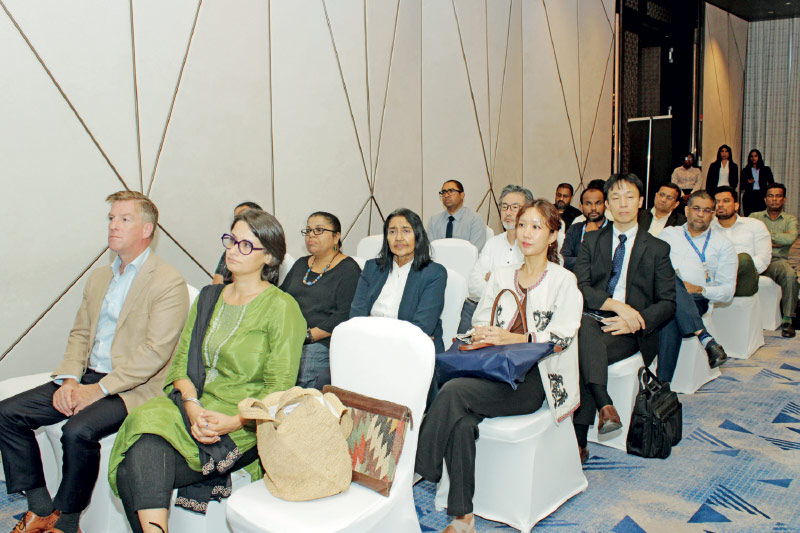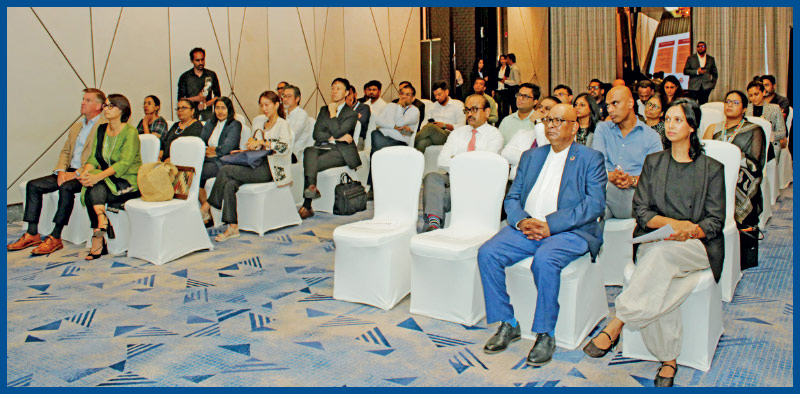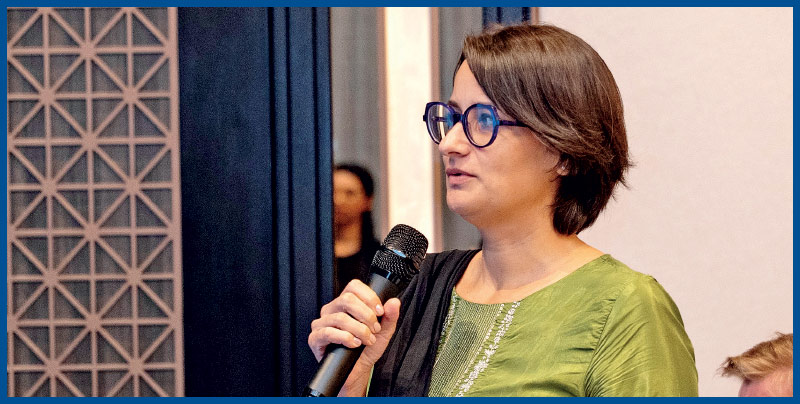LIIN catalyses next wave of impact investment in Sri Lanka
Chandula Abeywickerma, Founder & Chairman of the LIIN set the scene for the audience introducing the Impact Investment Summit 2026, noting that while impact investments and green financing are relatively new concepts in Sri Lanka, developed economies have been prioritizing them for the past 25 years.

 Nurturing genuine entrepreneurship in a country depends on the key stakeholders in the investment, banking and finance as well as the public and private sectors to see the bigger picture. It requires us to see eye-to-eye in economic empowerment of impact entrepreneurs and in creating access to equity investment, responsible debt and catalytic funding”
Nurturing genuine entrepreneurship in a country depends on the key stakeholders in the investment, banking and finance as well as the public and private sectors to see the bigger picture. It requires us to see eye-to-eye in economic empowerment of impact entrepreneurs and in creating access to equity investment, responsible debt and catalytic funding”
- The inaugural Lanka Impact Investment Summit 2026 will take place at the Shangri-La Colombo, February 12, 2026, including an Executive Immersion Program on Impact Investing on February 10-11, 2026. Register now at: https://impactsummit.lk/
Presenters at the briefing thoughtfully pieced together the four initiatives that together show the big picture and the potential of impact investing in Sri Lanka. The recommendations set out in the Impact Investment Landscape Study will help bridge gaps and chart a more inclusive and resilient future in Sri Lanka. The report is a first in providing a comprehensive mapping of the opportunities, challenges, and pathways to unlock private capital. The Social Enterprise Fund and On Eagles Wings reality show slated for next year are grounded in the principles of promoting social entrepreneurship that create positive environmental impact and enhance inclusion of women and the next generation. And the inaugural Lanka Impact Investment Summit 2026 represents years of ground work and will open the doors to shared knowledge, awareness and understanding. It will be a place where impact investment emerges as a transformative financial approach, and the future of business that aligns financial returns with measurable improvements in well-being and equity.
LIIN extended its gratitude to all the integral partners and sponsors with whom LIIN is collaboratively paving the way forward and pioneering these initiatives.
For more information about LIIN and these initiatives, go to: www.liin.lk

Question from Takafumi Kadano Country Director ADB
The Lanka Impact Investing Network (LIIN) aims to create a sustainable and inclusive economy in Sri Lanka by facilitating impact investments that generate social and environmental benefits alongside financial returns.

On October 22, 2025, the Lanka Impact
Investment Network (LIIN), announced several key
initiatives signaling the dawn of a transformative
era in the Sri Lanka’s economy, entrepreneurial
ecosystem, and impact investment landscape.
LIIN released the country’s first-ever impact
investment landscape study; established the
country’s first Social Entrepreneurial Fund (SEF);
unveiled a new reality TV series entitled On
Eagle’s Wings; and announced Sri Lanka’s
inaugural Impact Investment Summit, taking
place February 12th 2026.

In room full of partners, sponsors and stakeholders
in downtown Colombo, LIIN shared key findings
of the country’s first-ever impact investment
landscape study, made possible with the World
University Service of Canada and funded by the
Government of Canada. The study comes at a
critical time as the country looks to rebuild and
attract new types of capital.The study is the result
of collaboration across multiple partners, local
institutions, development finance institutions
(DFIs), and development organizations, all aligned
in a shared goal: to make Sri Lanka an attractive
and credible destination for impact investors.

. Camelia - Adriana BUCATARIU, Project
Manager, Circular Economy in the
Food Sector (CIRCULAR) Project,
Sri Lanka
- Another key initiative announced by LIIN
- during the evening: the establishment of
- the Social Enterprise Fund (SEF). The SEF
- will facilitate the inflow of global impact
- capital and sustainability finance to Sri
- Lanka. Created in partnership between
- the Lanka Impact Investing Network(LIIN),
- and the UNDP, SEF invests in businesses
- with strong growth potential and a clear commitment to making positive social
- and environmental impacts. SEF invests
- in companies which are moving into the
- acceleration phase from the incubation
- stage, and companies are given an
- investment andaccess to a mentorship
- network along with much needed
- capacity building workshops that
- maximizes their growth.

Ciarán Lavery - Country Director,
ACTED
- After having successfully facilitated invest
- -ments in 37 enterprises through the
- former and widely popular Ath Pavura TV
- reality show, LIIN also celebrated the
- launch of their upcoming reality TV series
- called On Eagle’s Wings. OEW will provide
- a platform for entrepreneurs to pitch their
- impact-driven businesses to potential
- investors, with a focus on sectors like
- climate adaptation, women led and
- inclusive businesses, and social impact.
- The OEW program is aiming to empower
- 400+ local social impact enterprises.

Chandula Abeywickerma, Founder &
Chairman of the LIIN
Chandula Abeywickerma, Founder & Chairman
of the LIIN set the scene for the audience
introducing the Impact Investment Summit 2026,
noting that while impact investments and green
financing are relatively new concepts in Sri Lanka,
developed economies have been prioritizing
them for the past 25 years.

 Nurturing genuine entrepreneurship in a country depends on the key stakeholders in the investment, banking and finance as well as the public and private sectors to see the bigger picture. It
Nurturing genuine entrepreneurship in a country depends on the key stakeholders in the investment, banking and finance as well as the public and private sectors to see the bigger picture. It
requires us to see eye-to-eye in
economic empowerment of impact
entrepreneurs and in creating
access to equity investment,
responsible debt and catalytic
funding”
- The inaugural Lanka Impact Investment
- Summit 2026 will take place at the
- Shangri-La Colombo, February 12, 2026,
- including an Executive Immersion Program
- on Impact Investing on February 10-11,
- 2026. Register now at:
- https://impactsummit.lk/
Presenters at the briefing thoughtfully pieced
together the four initiatives that together show
the big picture and the potential of impact
investing in Sri Lanka. The recommendations set
out in the Impact Investment Landscape Study
will help bridge gaps and chart a more inclusive
and resilient future in Sri Lanka. The report is a
first in providing a comprehensive mapping of
the opportunities, challenges, and pathways to
unlock private capital. The Social Enterprise Fund
and On Eagles Wings reality show slated for next
year are grounded in the principles of promoting
social entrepreneurship that create positive
environmental impact and enhance inclusion of
women and the next generation. And the
inaugural Lanka Impact Investment Summit 2026
represents years of ground work and will open
the doors to shared knowledge, awareness and
understanding. It will be a place where impact
investment emerges as a transformative financial
approach, and the future of business that aligns
financial returns with measurable improvements
in well-being and equity.
LIIN extended its gratitude to all the integral
partners and sponsors with whom LIIN is
collaboratively paving the way forward and
pioneering these initiatives.
For more information about LIIN and these
initiatives, go to: www.liin.lk

Question from Takafumi Kadano Country
Director ADB
The Lanka Impact Investing Network (LIIN) aims
to create a sustainable and inclusive economy in
Sri Lanka by facilitating impact investments that
generate social and environmental benefits
alongside financial returns.


Sri Lanka faces annual
$ 7-10 b investment gap
to meet SDGs
Friday, 31 October 2025 00:22

- Lanka Impact Investing Network releases
- first report on SL impact investment
- landscape
- SDG infrastructure gap alone $ 3–5 b
- annually, and $ 2–3 b for climate finance
- Women-led enterprises face a $ 695 m
- financing shortfall despite targeted policy
- reforms
- SMEs, which make up 52% of GDP, remain
- severely underfinanced
- Access to credit is constrained by high
- interest rates of 10–27%; collateral often
- exceeds loan values
- Commercial banks’ ESG portfolios account
- for less than 2% of total lending
- Launching $ 5 m Impact Enterprise Fund,
- a first for Sri Lanka, targeting SME
- financing gaps
- Includes first-loss guarantee covering up
- to 20% of potential defaults to attract
- investor confidence
- To set the stage for bigger funds in future
By Devan Daniel
Sri Lanka’s investment landscape faces deep
structural financing gaps despite growing global
appetite for social and environmental impact
capital, according to a new study by the Lanka
Impact Investing Network (LIIN) “Impact
Investing Landscape in Sri Lanka”.
LIIN was founded by veteran banker Chandula
Abeywickrema, who established Sri Lanka’s first
impact investing fund to channel private capital
into ventures creating measurable social and
environmental outcomes.
As Founder and Chairman of GSG Impact Sri
Lanka, he has linked the country to the Global
Steering Group for Impact Investing (GSG Impact
Global), a network spanning more than 50
countries that mobilises capital for sustainable
development.
The report, launched this week, offers the first comprehensive mapping of opportunities and
barriers to mobilising private capital for
development. It comes as Sri Lanka seeks new
sources of investment to rebuild a resilient
economy and restore investor confidence.
LIIN Senior Manager–Impact Investing, Vasanthen
Sivakajan said the study’s goal was to translate
regional insight into national action and position
Sri Lanka as a credible destination for impact
capital.
“Globally, the impact investment market reached
$ 1.5 trillion in 2024, growing by about 21% from
2019,” he said, noting that emerging markets
account for only 6% of total assets.
“South Asia’s impact investment market is valued
at around $ 20 billion,led by India and Bangladesh.
But despite contributing 45% of global GDP, the
region attracts only 14% of global impact capital.”
Sri Lanka’s challenges lie in limited access to
finance, high borrowing costs, and policy
fragmentation. SMEs, which contribute 52% to
GDP and employ nearly half the workforce, have
declined from 1.3 million in 2018 to 1.04 million
in 2024 amid the crisis.
“Bank loans remain the primary financing source,
but with interest rates between 10% and 27%
and collateral often exceeding loan values,
access to finance is severely constrained,”
Sivakajan said.
The study estimates investment demand of $7
–10 billion annually for sustainable development
goals, $ 3–5 billion for infrastructure, and $ 2–3
billion annually for climate finance.
Women-led enterprises face an additional $ 695
million funding shortfall despite new laws such
as the Women in Empowerment Act of 2024.
“Women-led SMEs make up only 25% of the
total, showing how much untapped potential
exists,” he said.
High-impact opportunities exist in renewable
energy, financial inclusion, sustainable
infrastructure, affordable housing, and
healthcare, but Sri Lanka’s ecosystem remains
fragmented.
“We have a vibrant ecosystem, but it’s operating
in silos,” Sivakajan noted. “There’s no national
impact investment policy or tax incentive frame
-work. Even the definition of an impact
enterprise is unclear.”
Institutional constraints persist. Commercial
banks’ ESG portfolios represent less than 2% of
total lending, while the country’s largest pension
and insurance funds are legally barred from
investing in impact assets. “Many still see impact
investing as philanthropy, not as capital that
expects returns,” he said.
Only around 700 to 1,000 SMEs are considered
investment-ready. “Weak financial literacy,
governance, and record-keeping undermine
investor confidence. When household and
business expenses are mixed, investors walk
away,” Sivakajan added.
To close the gaps, the study calls for an
operational impact investment fund, credit
guarantee facilities, and a pipeline acceleration
platform linking investors with enterprises.
It also recommends corporate immersion
programs, regulator training on “impact
underwriting,” and a public-private Impact
Investment Council to coordinate efforts.
“The aim is to move from fragmentation to
innovation,” Sivakajan said.
“Sri Lanka has strong entrepreneurial potential but is constrained by finance and coordination gaps. With the right frameworks, private capital can deliver measurable social and environmental impact.”
Lanka Impact Investing Network will launch Sri Lanka’s first Impact Enterprise Fund in partnership with the United Nations Development Program (UNDP), to address the financing challenges facing small and medium enterprises (SMEs) and startups that remain underserved by the country’s banking sector.
LIIN Director Jonathan Abeywickrema said the fund, initially established in 2019, is now ready for launch after delays caused by the Easter attacks, the pandemic, and the financial crisis. “We’ve already got a few supporters for the fund,” he said. “Today is a call to action.”
Abeywickrema said the fund was designed to fill a systemic gap where “funding in Sri Lanka goes only to 1% of SMEs.” He explained that traditional financial institutions continue to lend on collateral rather than business performance, leaving smaller firms with limited access to credit.
“Businesses are evaluated simply based on the collateral they give,” he said. “That’s the biggest problem in Sri Lanka.”
The Impact Enterprise Fund will start with $5 million, providing investments ranging between $ 50,000 and $ 100,000 through convertible notes. It includes a first-loss guarantee covering up to 20% of potential defaults to attract investor confidence.
“Sri Lanka’s average non-performing loan ratio is around 12% as of 2024. Our guarantee can absorb up to $ 1 million in defaults,” Abeywickrema said. “This is the first ever first-loss guarantee-backed fund in Sri Lanka.”
The fund’s early deployment is expected by mid-2026, with around ten investments across agriculture, tourism, IT, healthcare, apparel, and sustainable construction. “We don’t want to go too high or too low because we want to address the missing middle-income market that really needs to be propelled in terms of capital markets,” he said.
Each investee company will go through pre- and post-investment technical assistance for about six months, focusing on investment readiness, governance, and impact measurement.
“Startups don’t just need capital, they need hand-holding support,” Abeywickrema said. The program will also prioritise women-led enterprises. “We are planning to provide concessional capital and targeted support to female founders who often face additional barriers.”
He noted that Sri Lanka’s capital markets have limited private equity exits, with few listings on the Colombo Stock Exchange’s Empower Board.
“Our goal is to inspire SMEs to raise private equity and eventually list,” he said. “This is not about chasing returns but building a credible foundation for SME growth.”
Abeywickrema said the fund could serve as a prototype for future blended finance vehicles, combining private capital with development partner support. “When investors, the private sector, and SMEs come together, the equation starts to work. This is how we evolve Sri Lanka’s capital markets and build investor confidence.”

No comments:
Post a Comment